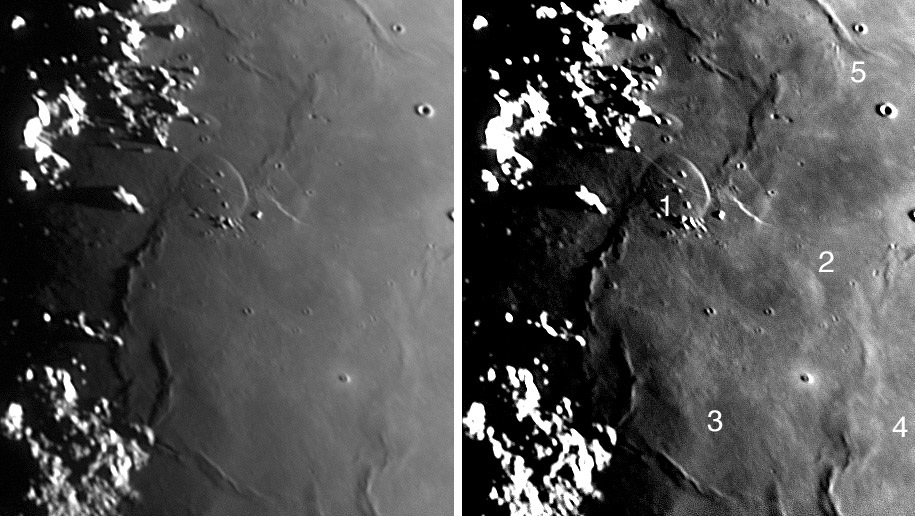Difference between revisions of "January 19, 2008"
| Line 17: | Line 17: | ||
[http://www.lpod.org/archive/LPOD-2004-08-13.htm More Valentines]<br /> | [http://www.lpod.org/archive/LPOD-2004-08-13.htm More Valentines]<br /> | ||
<br /> | <br /> | ||
| − | |||
<p><b>Yesterday's LPOD:</b> [[January 18, 2008|How Much Moon is Enough?]] </p> | <p><b>Yesterday's LPOD:</b> [[January 18, 2008|How Much Moon is Enough?]] </p> | ||
<p><b>Tomorrow's LPOD:</b> [[January 20, 2008|Falling Worlds]] </p> | <p><b>Tomorrow's LPOD:</b> [[January 20, 2008|Falling Worlds]] </p> | ||
<!-- End of content --> | <!-- End of content --> | ||
{{wiki/ArticleFooter}} | {{wiki/ArticleFooter}} | ||
Revision as of 21:38, 23 February 2015
Terminator Surfing the Swells of Mare Serenitatis

image by Jim Phillips
Jim Phillips often images close to the terminator, looking for domes and other features made visible by the grazing illumination. This view shows the low relief Valentine Dome (diameter of 35 km) of western Mare Serenitatis. In the right image I have mercilessly enhanced the original (with Photoshop unsharp mask) to bring out giant swells even more subtle than the Valentine Dome (1). Swell 2 is somewhat larger in diameter than the Dome, has a crisp boundary with the surrounding mare, but less steep slopes. In the enhanced view a curved line crosses the surface of 2, and a magnificent Apollo 15 image reveals that the line is a rille. With the benefit of Jim's view we can see on the Apollo 15 image that the rille is mostly contained within the swell, as is, to a lesser degree, the rille that cuts the Dome. The swell 2 rille probably formed by cracking of the mare surface that was uplifted to form the swell. And the uplift probably resulted from the rise of a batch of magma, that didn't erupt onto the surface. Swells 3, 4 and 5 are similar to 2, but less well-defined. Jim's image helps explain another mystery - why is there a fault on the mare to the east of the Valentine Dome? The very high resolution Apollo image clearly shows the fault, but doesn't hint at the small swell that the fault is mostly limited to. In this case the uplift resulted in a vertical rupture of the surface rather than a horizontal one as at swell 2. One final feature of interest. Between 1 and 5 is a delicate and narrow curved dimple that extends toward the south about 80 km. The mare surface appears more highly textured to the left, and smoother to right of the dimple line - is this a boundary between two lava flows?
Chuck Wood
Technical Details
Jan. 14, 2008. TMB 8" F/9 @ F/27
Related Links
Rükl plate 13
More Valentines
Yesterday's LPOD: How Much Moon is Enough?
Tomorrow's LPOD: Falling Worlds
COMMENTS?
Register, Log in, and join in the comments.



